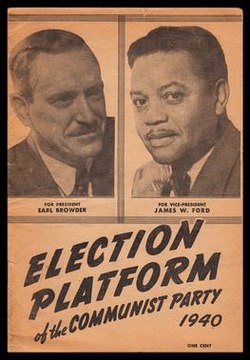Babson and Moorman shake hands
Babson's sign on the back of his Cadillac
Edgar Vaughn Moorman, January 21, 1878 (Big Spring, Ky.) - August 8, 1942 (Quincy, Ill.)
VP candidate for Prohibition Party (aka New Prohibition Party) (1940)
Running mate with nominee: Roger W. Babson (1875-1967)
Popular vote: 57,903 (0.12%)
Electoral vote: 0/531
The campaign:
In 1940 the Prohibition Party selected a ticket where both nominees were relative newcomers to the Party and neither one had ever run for office before.
Roger W. Babson was a Republican and ultra-wealthy eccentric entrepreneur. His running mate Edgar V. Moorman was a lifelong Democrat and successful businessman. Together they would shift the Prohibition Party to the religious hard right, where it still resides to this day.
The 1940 platform included this evangelical call to arms:
A Coalition Party
While both of the major political parties are performing useful service in emphasizing different needs, entangling alliances with corrupt interests, necessary to their success, make it impossible for these parties to take a definite stand on moral issues, even though these issues today are fundamental in solving our nation's problems. Therefore, there must be a union of church people and others who stand first for righteousness, into a Third Party. The NEW Prohibition Party serves such a purpose.
Shortly after the election Babson penned a book about the campaign. Among his many observations and suggestions was this: "Of one thing I am very certain-- namely, that 'Babson and Moorman' would have secured many, many more votes in 1940 if we had been on the ballot as a straight Church Party than as candidates of the Prohibition Party. I shall never run again as a Presidential candidate for any party; but I do insist that if churches will not combine and back the Prohibition Party, then a Church Party should be organized into which they will combine. Of course, the candidates must be high-grade churchmen, beyond reproach and having ability, intelligence, and experience. They should also be young men with courage and energy."
Moorman suggested the Party be renamed His Kingdom Party.
In an election year that was not kind to third parties, the Babson/Moorman ticket placed fourth nationally, considerably less than the Socialist Party of America, but just a shade more than the Communist Party USA. With votes recorded in 30 states, their best finish was in Arizona with 0.49%.
Election history: none
Other occupations: Ran a livestock feed and stock medicine company (Moorman Manufacturing Company, Quincy, Ill.)
Buried: Greenmount Cemetery (Quincy, Ill.)
Notes:
Started the Moorman Manufacturing Company with his brother Hamilton in Gorin, Mo., but later moved the operation to Quincy, Ill.
If elected he would have died in office when he suffered his heart attack Aug. 8, 1942.
Left half a million in his will to the Layman's Trust for Evangelism.
Methodist.





































